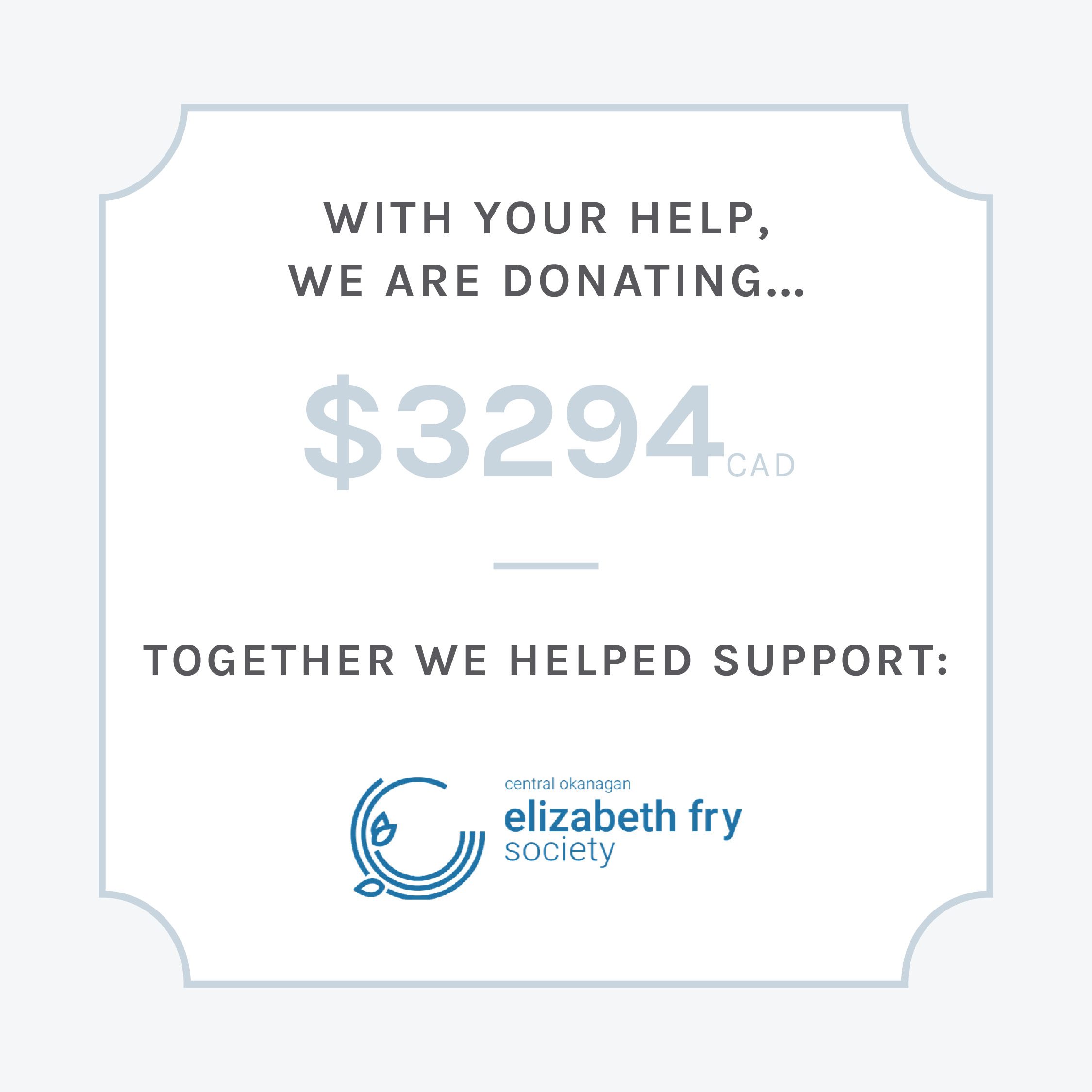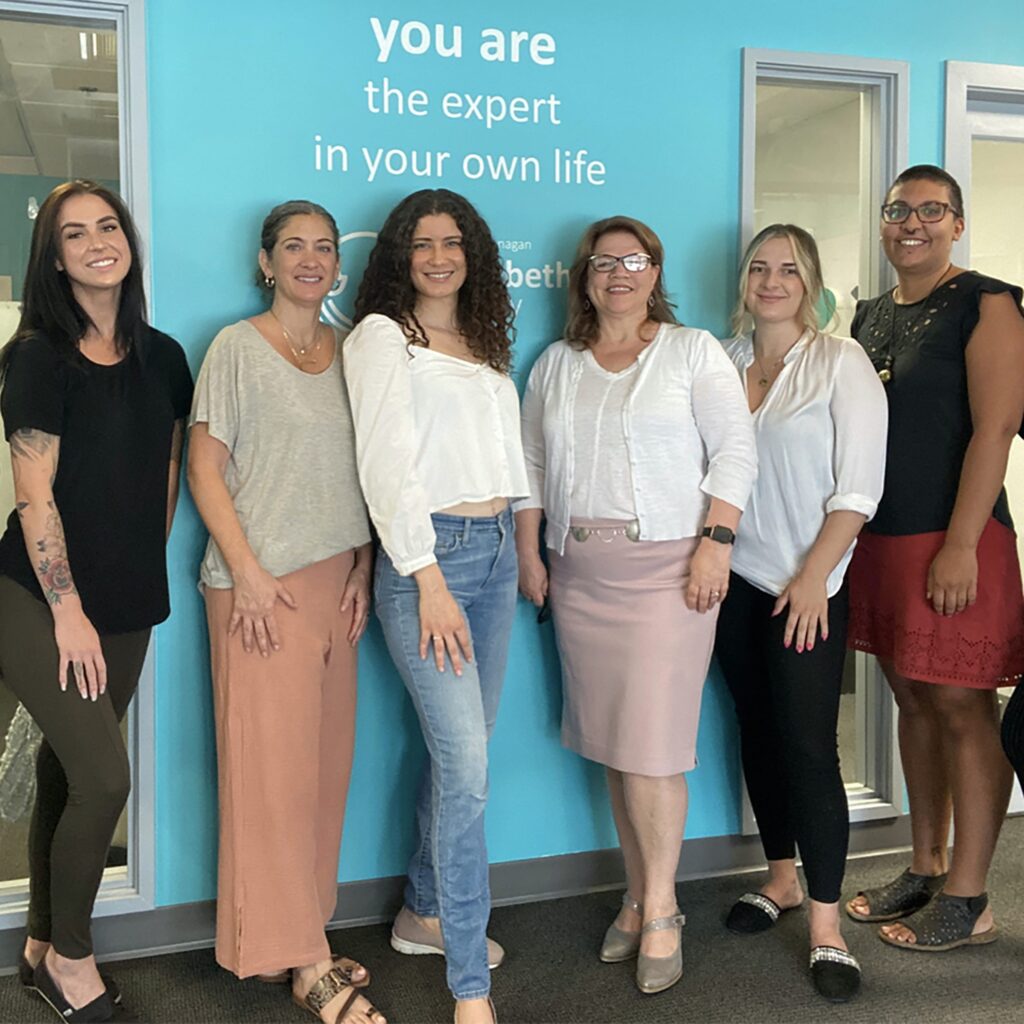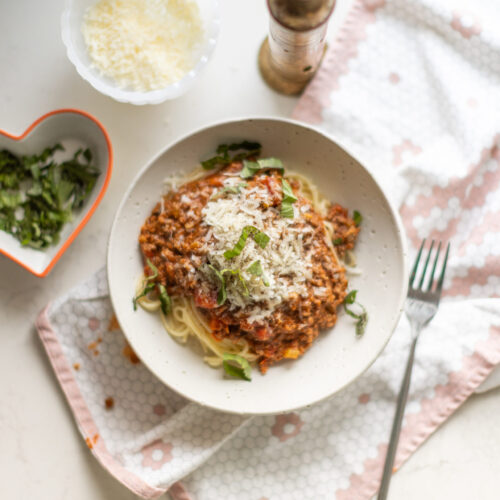It’s the beginning of August … so you know what that means; it’s time for another Cameo update! “Since the outbreak of COVID-19, emerging data and reports from those on the front lines, have shown that all types of violence against women and girls, particularly domestic violence, has intensified” – United Nations. To stand up against gender-based violence, this month’s Cameo recipient is the Central Okanagan Elizabeth Fry Society. A feminist organization that is a leader and specialist in the Central Okanagan for addressing trauma-informed services for sexual assault and intimate partner violence.
This month with YOUR help, we were able to raise… drumroll, please … $3,294 to donate to the Elizabeth Fry Society. Today, their team is taking over the blog to share some statistics on gender-based violence and how this month’s donation will help them continue to support those impacted by domestic violence.
If you’re curious to learn about our previous Cameo recipients, make sure to check out our blog posts here, or our philanthropy page, here!

Did you know that 1 in 3 women will experience physical domestic and/or sexual violence in their lifetime? The grim reality of this statistic is that somebody that you know or yourself has experienced an act of abuse. Over the past 17 months of the pandemic, data has shown that gender-based violence, particularly domestic violence, has increased. This is one of the most pervasive systemic issues … and unlike Covid-19, violence against women and children cannot be stopped with a vaccine.
Let’s highlight the reality
- Approximately every six days, a woman in Canada is killed by her intimate partner.
- 82% of those under 18 who experience sexual assault are girls.
- 200 million women have experienced female genital mutilation/cutting.

An act of violence that is committed against someone based on their gender identity, perceived gender, or gender expression is called gender-based violence (aka GBV). This type of violence can vary in degree of severity and type including sexual, psychological, physical, or emotional. In comparison to men, women often experience higher rates of intimate partner violence, injury, sexual violence and harassment. Something to keep in mind about this issue is the intersectionality of GBV, meaning other factors of an individual’s identity including their age, sexual orientation, ethnicity, socioeconomic status, and physical and cognitive ability can play a big role in a person’s risk of experiencing violence and their lack of access to support.
Gender Based Voilence and Intersectionality
- Indigenous women and girls experience violence at 3X higher than non-Indigenous women and girls.
- BIPOC individuals are more likely to experience workplace harassment.
- People with disabilities, especially women with mental disabilities, are 2X as likely to be sexually assaulted than people without disabilities.
- Transgender Canadians were more likely to have experienced violence since age 15 versus cisgender Canadians.
Alright, so now what?
How can you prevent these events from happening? Well … to look at ways we can help, we must travel back in time to see how it all began! In the olden days (way more recent than you might imagine), Canada’s perspective on violence against women was seen as less of a political issue and more of a private matter between a partner and their spouse. Oftentimes, abusive treatment in relationships was normalized and women were blamed for their assault (and unfortunately, in most places globally, this is still the norm). For several decades, women advocacy groups have been fighting for women’s voices both in the political and legislative spheres beginning with the first Canadian coordinated movement in the 60s. This was a remarkable era which altered the role of women in society and brought light to a variety of equality issues including employment, education, birth control, and violence against women. It was only in the 70s that sexual assault centers, transition homes, and victim assistance programs were established in British Columbia which allowed survivors to reach out for support on their healing journeys. It wasn’t until 1983 that Bill C-127 came into effect, making it an offence for a man to sexually assault his partner or wife (that’s only 38 years ago!). Having all these provisions draw attention to the need for action, GBV has become a widespread conversation which has geared policy makers, organizations, communities and service providers to speak up and stand up against such a major issue. Despite the progress, we still have a long way to go and need your help!
You may wonder… this issue is too big for one person to handle… where do I even begin!?
Education is a big piece of the puzzle. Taking proactive steps to educate yourself on the topic of sexual assault and other forms of gender-based violence can help you gain greater perspective on ways you can do your part to progress change in a better direction. For instance, seeking out training and prevention program opportunities both online and within your local community. There are a ton of online resources out there which offer free training and workshops. If you’re more of a bookworm, read “Everyday Sexism: The Project that Inspired a worldwide movement” by Laura Bates. This is a terrific read on learning about how racism, sexism, and homophobia are connected and perpetuate systemic discrimination against people’s rights.
The next step towards change is advocacy. Advocacy takes many different forms and can be as simple as addressing hateful comments (via online or in person). For instance, if you hear a family member making sexist or derogatory comments, interrupting troubling language and behaviour by saying things like “Calling women _____ is disrespectful. Please stop it.” can go a long way. Another form of advocacy can be supporting a person who has disclosed their sexual assault to you. They may want to share their story with you or need someone to come with them to the hospital, police, or court. Receiving a disclosure of sexual assault or any other form of violence and abuse can be a difficult experience. In times like this, remember that the person is telling you because they see you as a safe and trustworthy person. It is common to feel uncertain about what to say or do when receiving such news.
We’ve attached a few actionable ways you can help support survivors:
- The most powerful thing you can do is to start by believing. Statements like “I believe you” and “I am sorry this happened … I am here for you” can go a long way.
- Understand that the person might feel: shock, fear, disbelief, numbness, anger, and/or shame. These are all normal responses of trauma, and their way of coping with what has happened to them.
- Listen without interruption, asking questions, or seeking details. Focus on the feelings and reactions rather than on the story of what happened.
- Allow the person to share as much or as little as they wish and to express emotion without judgment.
- You have an opportunity to empower the survivor and assist them in their path forward, such as accessing additional supports.
- Lastly, remember that hearing a disclosure is often difficult on the listener as well. Please reach out for professional support if necessary.
What types of services do we have in the Okanagan community to support survivors of sexual assault and intimate partner violence?
Well, we are so glad you asked! Our organization, called the Central Okanagan Elizabeth Fry Society, has been battling these types of issues over the past 60 years, delivering trauma-informed support services to survivors of sexual assault and intimate partner violence. We provide a variety of specialized support including sexual assault counselling, court support, referrals, and psychoeducational programs. The pandemic has been particularly difficult for the survivors. Amidst COVID, community demand for sexual assault services at our organization have increased, with Kelowna RCMP stating a 15% increase in reports for sexual assault. Meeting the demand for services has been one of the most challenging parts which we have continuously struggled with. However, despite our team being small… We are mighty!
“Every day at Efry is so different and it keeps you on your toes. I am sometimes the only one who hears a person’s story…and sometimes the only one who believes the assault happened. I love the work that I do and I know that although the fight towards ending gender-based violence is slow, I am still adding small contributions to the bigger solution day by day” – Samantha, Victim Service Support Lead.
At EFry, we’ve witnessed life-changing results for survivors in our programs, including clients who are able to return to school, work, and move forward to have a strong sense of self-worth and healthy relationships. Being able to let go of self-blame and control psychological triggers can enable survivors to return to a full life. As our clients heal, the impact on those around them and the community at large is exponential!
“Join together and fight for empowerment, it is at your reach. Just extend your arm and let your hand be held. Stand strong and when the winds of your past threatens to blow you over, Elizabeth Fry will help you stand taller and stronger than ever before. 𝐓𝐚𝐤𝐞 𝐛𝐚𝐜𝐤 𝐲𝐨𝐮𝐫 𝐥𝐢𝐟𝐞.” – Abuse Survivor, Kelowna BC.

We are extremely grateful for the generous contribution of Jillian Harris and her team towards helping us support survivors! It takes a village to do the work that we do and we couldn’t have done it without everyone involved. We envision a community in which all are safe, equal, and empowered. How will you take part in this movement?
The Central Okanagan Elizabeth Fry Society





